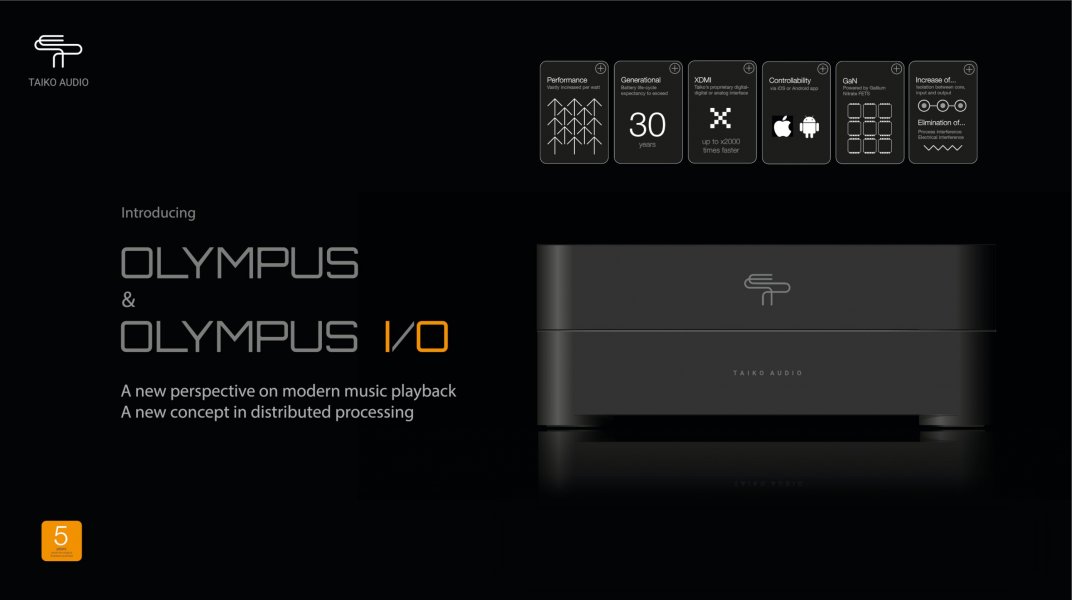consensus? here??????
let me summarize a bit (even though this is the olympus/wrong thread, right?).
ed was kind enough to drop by on monday to meet, talk deep audio techno geek, and listen to my system.
this is the music we played
Shared with Dropbox

www.dropbox.com
there are 3 directories, flac (the original files), wav-db (converted to wav by dbpoweramp) and wav-ff (converted to wav by ffmpeg). ed and i only listened to flac and wav-db (more on this later). in every case, ed and audio-bud carl were able to correctly identify the wav vs. flac file in the first 5-10 seconds of each track (hopefully confirming that i am not crazy).
setup: local files on extreme with jan11 backend software, latest android client app, router, switch and power distributor fed by battery power. usb out of extreme to sotm usb-aes/ebu converter (with superclock option, also battery powered), aes/ebu out to totaldac reclocker, aes/ebu output to totaldac triunity dac, balanced out to passlabs preamp, ayon triton monoblocks in triode mode, Nola metrogrande speakers.
[warning: nerd talk follows]
now, the next day ed and i were chatting and he mentioned that christian had been listening to some downloads and had noticed a difference between files, which got us wondering. the extreme uses ffmpeg to decode flac to wav before playback while i was using files pre-converted to WAV. perhaps the difference in sound, so obvious here, was the extra processing (more processing ==> more noise) from the file conversion.
a good way to test this hypothesis was to use ffmpeg offline to convert flac to wav.
on my linux pc (no windows or apple here), this was simple:
#!/bin/bash
# This script converts all .flac files in a directory to .wav using ffmpeg
# If ffmpeg is not installed run:
# sudo apt update
# sudo apt install ffmpeg
# Create a new folder for converted files
mkdir wav
# For each file in .flac files directory
for f in *.flac
do
# Convert to .wav keeping the same file name
ffmpeg -i $f ./wav/$(basename -- "$f" .flac).wav
done
@gboisvert
so, after creating the files in subdirectory wav-ff, i compared the wav-db with the wav-ff files.
the result was completely the opposite of what i'd expected, as the wav-db files sounded much
better than the wav-ff files. yes, two different WAV files sounded different, with the wav-ff file being much closer to the
original flac file. therefore, it seems to me that the structure of the wav files created by the converter
matters (a lot) and the degradation of flac may be due to the flac to wav conversion and/or wav file structure, even when that conversion is done offline! exactly the opposite of what i had hypothesized, which is a good reason to test ones assumptions even when you're sure (as i was) of the outcome.
a little web research (see wikipedia for WAV RIFF discussion) shows that the definition of wav file structures is not
the most well-defined standard out there. running mediainfo in detailed mode shows the RIFF structure of the wav-db
and wav-ff files are not identical. exactly what the cause may be consitutes a level of detail i'd love to know but don't have the
patience or skill to pursue further. perhaps this is due to the way the WAV file is packaged?
one of the links in the wikipedia article led me to this, which i excerpt here:
[excerpt starts]
Another way of storing waveform data
So, you're thinking "This WAVE format isn't that bad. It seems to make sense and there aren't all that many inconsistencies, duplications, and inefficiencies". You fool! We're just getting started with our first excursion into unnecessary inconsistencies, duplications, and inefficiency.
Sure, countless brain-damaged programmers have inflicted literally dozens of compressed data formats upon the Data chunk, but apparently someone felt that even this wasn't enough to make your life difficult in trying to support WAVE files. No, some half-wit decided that it would be a good idea to screw around with storing waveform data in something other than one Data chunk. NOOOOOOOOOOOOOO!!!!!!
For some god-forsaken reason, someone came up with the idea of using an imbedded IFF List inside of the WAVE file. NOOOOOOOOOOOOOOOOO!!!!!!!! And this "Wave List" would contain multiple 'data' and 'slnt' chunks. NOOOOOOOOOOOOOOOO!!!! The Type ID for this List is 'wavl'.
I strongly suggest that you refuse to support any WAVE file that exhibits this Wave List nonsense. There's no need for it, and hopefully, the misguided programmer who conjured it up will be embarrassed into hanging his head in shame when nobody agrees to support his foolishness. Just say "NOOOOOOOOOOOOOO!!!!"
[excerpt ends]
i don't know if this specific issue is at play here (i certainly have no evidence that it does), but i so enjoyed reading this guy's passion on the subject.
[end techno geek]
so what have i concluded:
1. in my system, WAV files created by dbpoweramp vastly outperform flac files and WAV files created by ffmpeg.
2. since the extreme is using ffmpeg to decode flac (and therefore all current streaming options), there is great potential to improve the sound of streaming sources, at least in my system. as i told ed, "maybe then i'll be able to tolerate streaming."

3. why doesn't everyone hear what ed, carl and i heard? how could this be system dependent? i trust the ears of many of the knowledgable folks here, but i am at a loss to understand why/how this large difference in SQ is perceived differently. but good things should come out of a deeper understanding.
4. does this change with other than 16/44 red book files? i don't know but will test that (now that i've thought of it).
5. perhaps your system have better/cleaner power or cables or ......?
have a good weekend everyone.
marty (aka cat6man)



